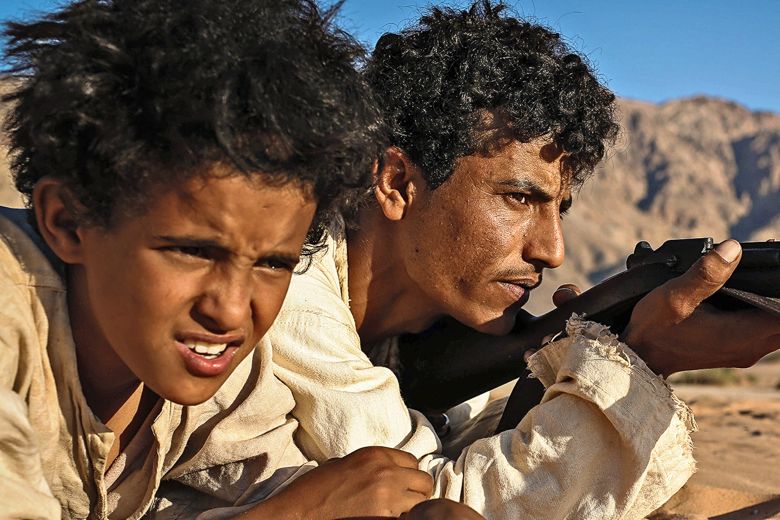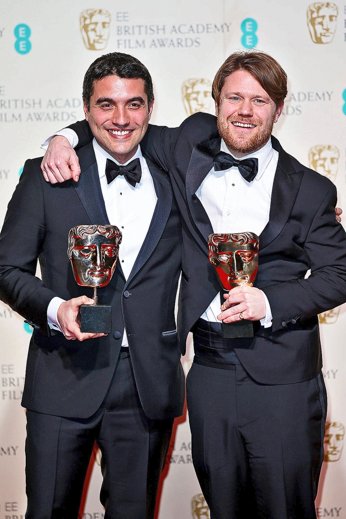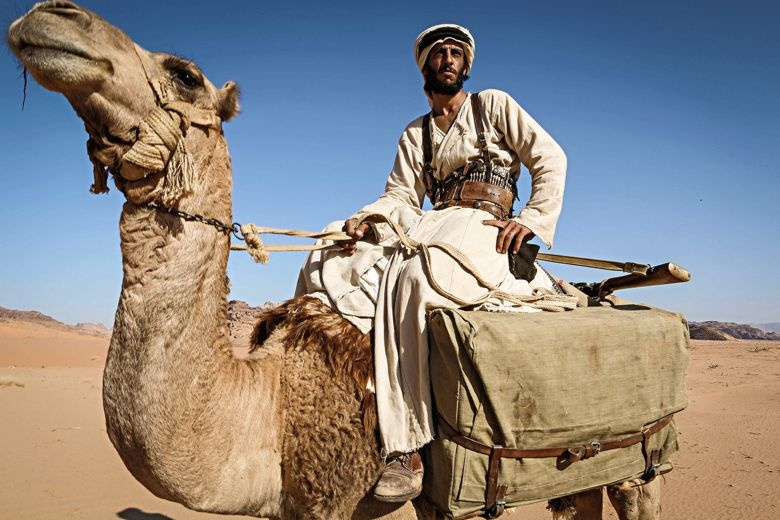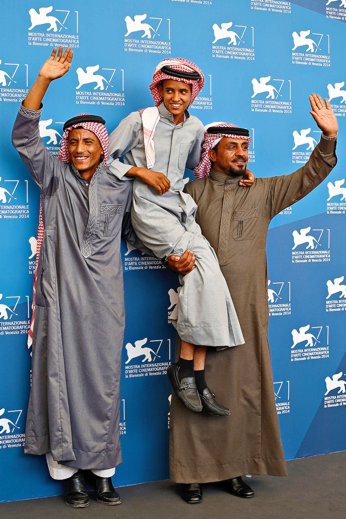The Bedouin boy taking his epic to the Oscars
reviewed for The Times, 25th February 2016

Jacid Eid al-Hwietat as Theeb and Hussein Salameh al-Sweilhiyeen as Hussein
On a wet Tuesday morning in London, Naji Abu Nowar sinks on to my living-room sofa with the dazed expression of a 34-year-old who has just won his first Bafta and hasn’t slept since Sunday. “I’m pretty sure Julie Walters thinks I’m a stalker. She was backstage, I started genuflecting, I had to be dragged away. I mean, Educating Rita was one of the films that made me.”
We’ve been in touch since Theeb, Abu Nowar’s coming-of-age tale set in the Bedouin desert, appeared as a well-regarded talking point at Arab-language film festivals. Now, the British-Jordanian director has won Jordan its first Oscar nomination in the foreign language category. Yet the big surprise was this Bafta win for outstanding British debut, which he shared with his collaborator and producer Rupert Lloyd.
In London, the pair’s phones are buzzing (“they cut to Steven Spielberg clapping while we went on stage — all our investors are trying to lip-read what he said”). Their thoughts, though, are back in Wadi Rum, the desert region inhabited by the last remnants of Jordan’s Bedouin tribes, including the community that allowed Abu Nowar to make his film.
Perhaps these nomadic goat-herders represent the Arabs’ true ancestors; certainly their culture of guest-friendship, endurance and campfire storytelling feels close to Homer. Modernity is encroaching, however. When Abu Nowar finally tracks down his adolescent Bedouin star, Jacir Eid al-Hwietat, so he can talk to me on Skype, he has to be dragged away by his father from another mobile phone.

Naji Abu Nowar and Rupert Lloyd with their Bafta awards
Three years ago, “Jaci” was a 12-year-old boy who had never left Jordan and had ventured out only twice from Wadi Rum (an hour from Jordan’s Red Sea resort of Aqaba) to the capital, Amman. Now, 15 but still shy, more gangly but still wide-eyed, he’s prepping for the Oscar red carpet. Through a translator — the real language of Theebis Jaci’s thickly accented Bedouin dialect — he tells me he’ll be wearing traditional dress, jazzed up by a top Amman designer. Much more importantly, he’ll be desperately looking out for his idol, Dwayne “The Rock” Johnson.
For many among the Amman intelligentsia, the Bedouin are a fringe curiosity. However, Abu Nowar, the son of a Jordanian ambassador and an English school secretary, says: “I’ve always had a sympathy for people caught between different pressures.”
Theeb is Abu Nowar’s love letter to Bedouin culture, filmed with the full collaboration of Jaci’s tribe. Cinematically, it’s an old-school western; as a story, it’s a folk tale. A noble father dies and leaves three brothers. The eldest must take on the headship of the tribe — he’s busy with local alliances and internal squabbles, and we never learn his name. The warm-hearted middle brother, Hussein, has more time for the youngest, Theeb (Jaci), gently teaching him how to kill a goat or draw a well, returning his mischief with affectionate horseplay.
Yet this is 1916 and the front line of the Arab Revolt against the Ottoman Empire, encouraged by the British. So when Lawrence of Arabia lookalike Edward appears in the desert — played by Jack Fox, the film’s only trained actor (and son of James Fox and brother to Laurence) — Hussein is selected to guide him through the treacherous local passes, known only to a true Bedouin. Theeb childishly follows them, only to find himself the sole survivor of an outlaw attack. Like John Wayne, Clint Eastwood or Toshiro Mifune before him, he’s left to find his way out of the wasteland, avenge his brother and emerge a man.
I suspect that as the youngest of 13 half-siblings, including two brothers, Abu Nowar has a sympathy for the fairytale hero left to shape his own fortune. Educated and raised primarily in England, he was sheltered in part from the pressures and privilege of life in a prominent Jordanian family. (“When Rupert and I were first making this film, penniless, we got jobs laying dancefloors. We did the floor at the Grosvenor Hotel ballroom — and there we were on Sunday, at the Baftas, dancing on it.”)
Theeb is also the story of a loner exploring away from the pack — the name translates as “wolf”. It’s beautifully shot by Wolfgang Thaler, known for his work with the director Ulrich Seidl, but depends on Jaci’s vulnerable luminosity. He has the subtlety of an experienced actor — the slightest twinge of a lip as he buries a family member; his chin jutting just high enough to be brave, just shaky enough to be fearful, during a harrowing scene of Theeb’s night vigil in a besieged sandstone cavern. The fluidity of his scenes with Hussein comes naturally — the two actors are cousins, and Abu Nowar spent a year immersed in their family’s lifestyle before shooting.

Marji Audeh as the British officer’s guide
If Theeb depicts a dying tradition, Jaci embodies it. The adults who act alongside him were born as nomads; Jaci alone was born in a settled village. Unlike his grandparents, he can read and write (his father was born in a tent in the desert); on the other hand, the film-makers discovered early that if they expected their authentic Bedouin star to ride a camel, they would have to teach him.
“It’s very like the tragedies that happened to the native Australians or Americans,” Abu Nowar concludes. “There are two options when you meet the outside world: radical religion or drugs and alcohol.” Five hundred metres from Jaci’s village, the crew tell me, a growing pit of empty bottles marks the spot where local addicts slink away to block out the ennui of unemployment and a life in trailer parks.
All this is gently foreshadowed in Theeb’s 1916 setting. The motif of modernity, as in all westerns, is the smooth metallic scar of a new railway line, the game-changing Hejaz railway between Damascus and Medina. The sudden rise in local banditry is slowly revealed to have far-reaching geopolitical roots.
Abu Nowar insists, however, that the best of the tribe’s culture of hospitality endures. “They will still slaughter their last horse to feed a guest — that’s like burning your Ferrari to keep someone warm.” His proudest achievement is to have secured the support of the community as co-authors. “The cast perform as actors, tell their own stories — they’re not some kind of endangered documentary subjects.” The men allowed him to film a traditional feast of hospitality in a central tent, guided his cameramen to scenic vantage points on local trails and advised on music and folklore.
Only once during our four-hour conversation does the friendly film-maker on my sofa suddenly jolt into a hardened defensive stance. Although Bedouin women made the most of the props, they were not allowed on screen by the tribe’s leaders. At every Q&A since the film opened in the west, Abu Nowar has been asked about the Bedouin women’s effacement from the film. Before I even have a chance to develop my question, he points out that women can be seen in the background of one shot (played by less reticent local gypsies) and heard in the soundtrack.
It’s true that his first job was to win local trust: “The great thing is, now they’ve seen the finished film and they’ve seen it’s respectful, some of the families — not all — say they’ll let women take part next time.” However, the fact is that this is a film about masculinity, and no worse for it, set in a culture as macho as that of cowboy or samurai. Each of the trials that Theeb endures — such as a night alone in the desert — is a high-stakes expansion of the traditional coming-of-age rituals required to prove oneself a Bedouin man.

Hussein Salameh al-Sweilhiyeen, Jacir Eid al-Hwietat and Hassan Mutlag al-Maraiyeh, who plays the Stranger, at the Venice Film Festival, 2014
The motif of rebirth — a fixture of initiation myth across the globe — is key. In one stunning central scene, Theeb hides, presumed drowned, below the waterline of a well, then slowly hauls himself, foothold by slippery foothold, out into the light. In post-production, Lloyd noticed that Jaci hadn’t put his head under the water once, clearly rigid with fear and unable to swim. So Abu Nowar spent four months of weekends giving his lead actor elementary swimming lessons before reshooting the entire sequence in post-production. (“Much harder than riding a camel,” Jaci tells me. “And messier.”)
Like all Jordanian Bedouin children, Jaci attends a military school, and he had to ask for special permission to grow his hair long to shoot the film. As it had been cropped to regulation length by the time they reshot the scene, Abu Nowar commissioned a wig. “I was doing take after take, desperately hoping it wasn’t going to float off in the water.”
When I suggest that the military administration of Bedouin areas is an expression of authoritarian control by the Jordanian establishment, Abu Nowar parries diplomatically, describing it as the most efficient form of welfare. He clearly has plenty to say on historical politics, talking with sorrow and detail about pre-Islamic Nabataean archaeology under threat in neighbouring Saudi Arabia. “People don’t talk about that part of our history; it’s partly that if you celebrate a pre-Islamic relic, it becomes a target. Look what Isis did to Palmyra: that was a temple to djinn culture, which is the mythology behind Theeb.”
He breaks off abruptly. He’s a new national celebrity in Jordan and careful to watch his words, concerned about the coalition of support he’ll need to make his next film. “Really, he just wants to be left alone to make Chuck Norris movies,” volunteers Lloyd — certainly, there are plans in the works to make more action films, as well as to return to Wadi Rum.
Yet as we part Abu Nowar seems well aware that nothing in the modern Middle East is entirely above the censor’s scrutiny. “I just want to make films for the sake of films,” he tells me, “but since when did it become political to make a film that celebrates music?”






